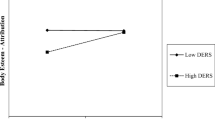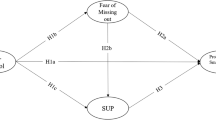Abstract
Recent research reveals that problematic smartphone use can impair adolescent self-esteem. However, little is known about the mediating and moderating mechanisms underlying this relationship. The current study investigated (a) the mediating effect of procrastination in the association between problematic smartphone use and adolescent self-esteem, and (b) the moderating effect of upward social comparison in the relationships between problematic smartphone use and adolescent self-esteem. This model was analyzed with 762 Chinese adolescents (mean age = 16.79 years, SD = .91). Participants filled out questionnaires regarding problematic smartphone use, self-esteem, procrastination, and upward social comparison. The results indicated that procrastination mediated the link between problematic smartphone use and adolescent self-esteem. Moderated mediation indicated that the mediated path was stronger for adolescents with high levels of upward social comparison. These findings highlight the importance of identifying the mechanisms that moderate the mediated paths between problematic smartphone use and adolescent self-esteem.


Similar content being viewed by others
References
Bai, X., Liu, X., & Liu, Z. (2013). The mediating effects of social comparison on the relationship between achievement goal and academic self-efficacy: Evidence from the junior high school students. Journal of Psychological Science, 36(6), 1413–1420.
Beck, B. L., Koons, S. R., & Milgrim, D. L. (2000). Correlates and consequences of behavioral procrastination: The effects of academic procrastination, self-consciousness, self-esteem and self-handicapping. Journal of Social Behavior and Personality, 15(5), 3–13.
Belsky, J., & Pluess, M. (2009). Beyond diathesis stress: Differential susceptibility to environmental influences. Psycholgical Bulletin, 135(6), 885–908.
CNNIC (2018, July). The 42st China Statistical Report on Internet Development. Retrieved from http://www.cnnic.net.cn/hlwfzyj/hlwxzbg/hlwtjbg/201808/t20180820_70488.htm. Accessed Sept 2018
de Vries, D. A., & Kuhne, R. (2015). Facebook and self-perception: Individual susceptibility to negative social comparison on Facebook. Personality and Individual Differences, 86, 217–221.
Donnellan, M. B., Trzesniewski, K. H., & Robins, R. W. (2011). Self-esteem: Enduring issues and controversies. In T. Chamorro-Premuzic, S. von Stumm, & A. Furnham (Eds.), The WileyBlackwell handbook of individual differences (pp. 718–746). New York: Wiley-Blackwell.
Ferrari, J. R. (1994). Dysfunctional procrastination and its relationship with self-esteem, interpersonal dependency, and self-defeating behaviors. Personality and Individual Differences, 17(5), 673–679.
Festinger, L. (1954). A theory of social comparison processes. Human Relations, 7(2), 117–140.
Hayes, A. F. (2013). Introduction to mediation, moderation, and conditional process analysis: A regression-based approach. New York: Guilford Press.
Jin, Y., Sun, C., An, J., & Li, J. (2017). Attachment styles and smartphone addiction in Chinese college students: The mediating roles of dysfunctional attitudes and self-esteem. International Journal of Mental Health and Addiction, 15(5), 1122–1134.
Kardefelt-Winther, D. (2014). A conceptual and methodological critique of internet addiction research: Towards a model of compensatory internet use. Computers in Human Behavior, 31, 351–354.
Kim, E., & Koh, E. (2018). Avoidant attachment and smartphone addiction in college students: The mediating effects of anxiety and self-esteem. Computers in Human Behavior, 84, 264–271.
Kwon, M., Kim, D. J., Cho, H., & Yang, S. (2013). The smartphone addiction scale: Development and validation of a short version for adolescents. PLoS One, 8(12), e83558.
Lay, C. H. (1986). At last, my research article on procrastination. Journal of Research in Personality, 20(4), 474–495.
Lim, S., & Shim, H. (2016). Who multitasks on smartphones? Smartphone multitaskers' motivations and personality traits. Cyberpsychology, Behavior and Social Networking, 19(3), 223–227.
Litt, D. M., Stock, M. L., & Gibbons, F. X. (2015). Adolescent alcohol use: Social comparison orientation moderates the impact of friend and sibling behaviour. British Journal of Health Psychology, 20(3), 514–533.
Litt, D. M., Waldron, K. A., Wallace, E. C., & Lewis, M. A. (2019). Alcohol-specific social comparison as a moderator of the norms-behavior association for young adult alcohol use. Addictive Behaviors, 90, 92–98.
Little, R. J., & Rubin, D. B. (2002). Statistical analysis with missing data (2nd ed.). New Jersey: Wiley.
Liu, Q.-Q., Zhou, Z.-K., Yang, X.-J., Kong, F.-C., Niu, G.-F., & Fan, C.-Y. (2017a). Mobile phone addiction and sleep quality among Chinese adolescents: A moderated mediation model. Computers in Human Behavior, 72, 108–114.
Liu, Q.-Q., Zhou, Z.-K., Yang, X.-J., Niu, G.-F., Tian, Y., & Fan, C.-Y. (2017b). Upward social comparison on social network sites and depressive symptoms: A moderated mediation model of self-esteem and optimism. Personality and Individual Differences, 113, 223–228.
Monroe, S. M., & Simons, A. D. (1991). Diathesis-stress theories in the context of life stress research: Implications for the depressive disorders. Psychological Bulletin, 110(3), 406–425.
Nayak, J. K. (2018). Relationship among smartphone usage, addiction, academic performance and the moderating role of gender: A study of higher education students in India. Computers & Education, 123, 164–173.
Orth, U., Robins, R. W., & Widaman, K. F. (2012). Life-span development of self-esteem and its effects on important life outcomes. Journal of Personality and Social Psychology, 102(6), 1271–1288.
Rosenberg, M. (1965). Society and the adolescent self-image (Vol. 11, p. 326). Princeton: Princeton University Press.
Sowislo, J. F., & Orth, U. (2013). Does low self-esteem predict depression and anxiety? A meta-analysis of longitudinal studies. Psychological Bulletin, 139(1), 213–240.
Steel, P. (2007). The nature of procrastination: A meta-analytic and theoretical review of quintessential self-regulatory failure. Psychological Bulletin, 133(1), 65–94.
Thaman, S. (2012). Effects of academic procrastination on self esteem and test anxiety. International Journal of Psychology, 47, 317–317.
Thogersen-Ntoumani, C., Dodos, L., Chatzisarantis, N., & Ntoumanis, N. (2017). A diary study of self-compassion, upward social comparisons, and body image-related outcomes. Applied Psychology-Health and Well Being, 9(2), 242–258.
Wang, P., Zhao, M., Wang, X., Xie, X., Wang, Y., & Lei, L. (2017). Peer relationship and adolescent smartphone addiction: The mediating role of self-esteem and the moderating role of the need to belong. Journal of Behavioral Addictions, 6(4), 708–717.
Wang, P., Lei, L., Wang, X., Nie, J., Chu, X., & Jin, S. (2018a). The exacerbating role of perceived social support and the “buffering” role of depression in the relation between sensation seeking and adolescent smartphone addiction. Personality and Individual Differences, 130, 129–134.
Wang, P., Nie, J., Wang, X., Wang, Y., Zhao, F., Xie, X., ... Ouyang, M. (2018b). How are smartphones associated with adolescent materialism? Journal of Health Psychological.
Yang, Z. Y. (2018). An exploration of problematic smartphone use among Chinese university students: Associations with academic anxiety, academic procrastination, self-regulation and subjective well-being. Journal of Behavioral Addictions, 7, 166–166.
Funding
The present study was supported by the Outstanding Innovative Talents Cultivation Funded Programs 2017 of Renmin University of China, and fund building world-class universities (disciplines) of Renmin University of China.
Author information
Authors and Affiliations
Corresponding author
Ethics declarations
Ethical Approval
All procedures performed in studies involving human participants were in accordance with the ethical standards of the institutional and/or national research committee and with the 1964 Helsinki declaration and its later amendments or comparable ethical standards.
Conflict of Interest
On behalf of all authors, the corresponding author states that there is no conflict of interest.
Informed Consent
Informed consent was obtained from all individual participants included in the study.
Additional information
Publisher’s note
Springer Nature remains neutral with regard to jurisdictional claims in published maps and institutional affiliations.
Rights and permissions
About this article
Cite this article
Wang, P., Lei, L. How does problematic smartphone use impair adolescent self-esteem? A moderated mediation analysis. Curr Psychol 40, 2910–2916 (2021). https://doi.org/10.1007/s12144-019-00232-x
Published:
Issue Date:
DOI: https://doi.org/10.1007/s12144-019-00232-x




